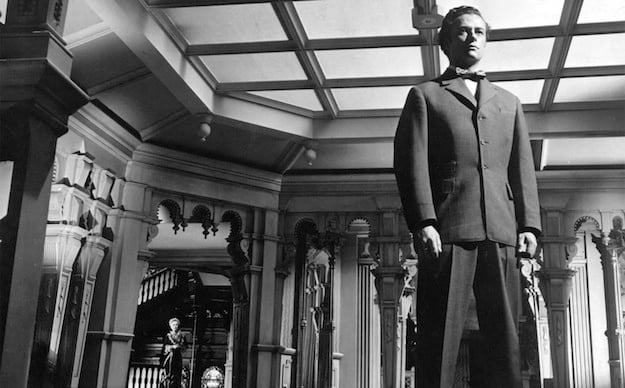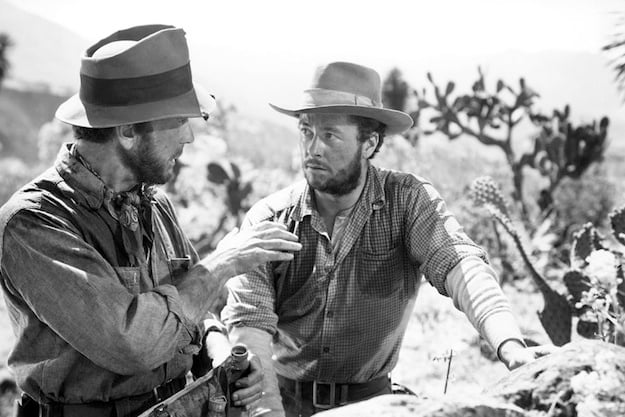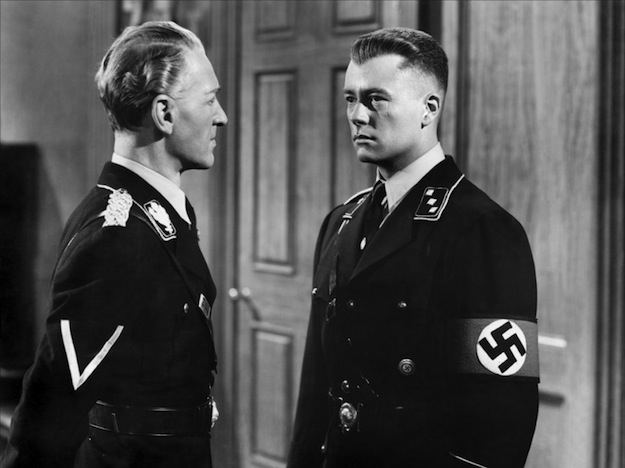The Magnificent Ambersons The night of August 9 in this year’s “Summer of the Stars” at TCM boasts a mighty one-two punch at the top of the bill: The Treasure of the Sierra Madre, followed by The Magnificent Ambersons. Then comes Gregory La Cava’s breezy Fifth Avenue Girl, and finally, Edward Dmytryk’s delirious Hitler’s Children. Who ties these wildly disparate films together? Tim Holt, the soft-faced, soft-spoken actor whose career was made up of B Westerns on the one hand, and on the other, a handful of starring and supporting roles in some of the greatest American films ever made. It’s often said (by me, anyway) that you could construct an excellent survey course in Hollywood movies using only the filmography of Ward Bond. Despite the comparative brevity of his career, you wouldn’t do too badly with Tim Holt, either. “One of the most interesting actors that’s ever been in American movies,” Orson Welles told Peter Bogdanovich, “and he decided to be just a cowboy actor. Made two or three important pictures in his career, but was very careful not to follow them up—went straight back to bread-and-butter Westerns.” By my own count, Holt was in six important films (Ambersons, Stagecoach, My Darling Clementine, Stella Dallas, Sierra Madre, and History Is Made at Night), three excellent ones (Fifth Avenue Girl, the 1941 Back Street, and His Kind of Woman), and one that’s interesting as all hell (Hitler’s Children). But no matter how your calculus runs, Welles was right: Holt chose his path, it didn’t choose him. Born in Beverly Hills, the son of Jack Holt, who for many years was a dependable star of Columbia Westerns, Holt went straight from military boarding school to trying his hand as an actor. And the pattern Welles described was established almost from the beginning. Holt got a bit part as the SOS radio operator in Frank Borzage’s shimmering History Is Made at Night (1937), followed that with a small but telling role as the tony young man who falls in love with the adored daughter of Stanwyck’s Stella Dallas. Then, presto, he was back in things like The Renegade Ranger (1938). That’s not to insult Holt’s career in Westerns; I haven’t seen most of them, but the two that I have (Overland Telegraph and Wild Horse Mesa) are solid, entertaining, and visually interesting. Still, there is something mysterious about a talented man who stayed so indifferent to A-list stardom, no matter how close he came to it. Film historian Ed Hulse told me: “Tim’s sister Jennifer Holt, who acted in many B Westerns herself, once confessed to me that Tim cared little for stardom and its trappings, which is why he never made serious attempts to parlay his work in Ambersons, Sierra Madre, Clementine, etc. into better opportunities.” But, says Hulse, Tim Holt “craved his father’s approbation. Both he and Jack felt it was an honorable career to be role models for kids, even if it meant staying mired in unimportant B pictures—as long as they were quality B pictures, which Tim insisted upon, especially after the war when he had more clout.” Holt was also married and a father by age 20, so steady work may have meant more than chasing top-shelf status. When television began to kill the market for B Westerns in the early ’50s, Holt moved on to managing a radio station and various other careers, and told people he had no regrets.
The Treasure of the Sierra Madre Early on, Holt did work his way into larger parts, such as the spoiled son learning responsibility, and falling in love, when Ginger Rogers invades the family mansion in Gregory La Cava’s Fifth Avenue Girl (1939). Much of Holt’s body language is that of a young lord, legs planted apart while he attempts to show an inferior what’s what. The character of Tim Borden is stuffy, resentful, mother-ridden, with a burgeoning sexual itch for a lively young woman. Holt plays Borden dead-straight, so he’s natural and believable, but he’s a little too heavy for the surroundings (compare him with someone like Fred MacMurray or Don Ameche and you’ll see what I mean). It’s a performance that plays brilliantly, however, when he very nearly gives it again, as George Amberson Minafer in The Magnificent Ambersons. Ambersons remains the Mt. Everest of films maudits, hacked down by RKO “with a lawnmower,” as Welles said. The film that we have, though, is starkly moving, and Holt must carry a large part of it. Perhaps what made Holt so interesting to Welles was the actor’s disregard for likability, unusual in 1942 or any other year, for that matter. George is what he is—blinkered, lazy, catastrophically spoilt, and Holt never once tries to soften him. He seems once more to be echoing some kind of royalty; his aristocratic body language is nothing like his easy, loping cowboys or the Nazi he plays in Hitler’s Children. George is a narcissist, but he’s one who listens, and in Holt’s intense concentration on what another character says, you can see all of George’s calculations reflected: “What does this have to do with me? How do I benefit?” You can trace the Ambersons’ fortunes through the set of Tim Holt’s shoulders, as they droop a little more through each disaster, until, finally, comeuppance is there with George on his knees. The following year Holt scored a large role in Hitler’s Children, playing a morally conflicted American-born Gestapo officer in a film that is every bit as insane as that sounds. It’s well worth watching (once), for its prurience about Nazi eugenics (they’re mating young Aryans like thoroughbreds!) and its near-poignant naiveté about how horrific wartime Germany really was. Holt gives his role a romantic cast—his character is in love with an American (Bonita Granville) whose parents decided Nazi Germany was a great place for boarding school—and emerges with dignity mostly intact.
Hitler’s Children Soon after Holt joined the Air Force as a B29 bombardier, attaining the rank of lieutenant. On the last day of World War II he was wounded during a run over Tokyo, and he was awarded a Purple Heart. When Holt came back, he played a small part in John Ford’s majestic My Darling Clementine as Virgil Earp, taking advantage of his leaner build and the way the war had carved his resting expression into something more somber and fully adult. That quality was used even more fully when he played drifter-turned prospector Bob Curtin in The Treasure of the Sierra Madre, probably the Tim Holt role that is best remembered by the general public. Set between Walter Huston’s cackling old-timer Howard and Humphrey Bogart’s Fred C. Dobbs (“I play the worst shit you ever saw,” Bogart told a critic before shooting began), Holt decides the only way to walk through this roughneck movie is softly. Morally, Curtin is not that much better than Dobbs in many ways, and Holt shows this in scenes such as the beating that the two mete out to the con artist who cheated them of construction wages. Once their victim is down, Bogart and Holt punch and kick in a kind of savage pas de deux. Curtin is just as willing as Dobbs to shoot the foolhardy prospector (Bruce Bennett) who tails him back to the camp. His humanity emerges slowly, and at first is based mostly on the fact that Dobbs is insane, and Curtin is not. My favorite Holt moment is one that some people may not even notice, and it comes after Curtin tries to kill a gila monster that has crawled under a rock. Unbeknownst to Curtin, this is where Dobbs has hidden his stash of gold, and a furious Dobbs draws a gun. Curtin puts his hands up and tries to tell his crazed business partner about the danger. As he talks, maintaining eye contact, he gives an ever-so-slight thumb wiggle to indicate the lizard’s hiding place. The life-or-death information conveyed in that one subtle gesture is, to me, the essence of Tim Holt’s acting. Hitler’s Children airs August 9 on Turner Classic Movies, along with several other films featuring Tim Holt. Farran Smith Nehme writes about classic film on her blog, Self-Styled Siren, and recently published her first novel, Missing Reels. She is a member of the New York Film Critics Circle.


